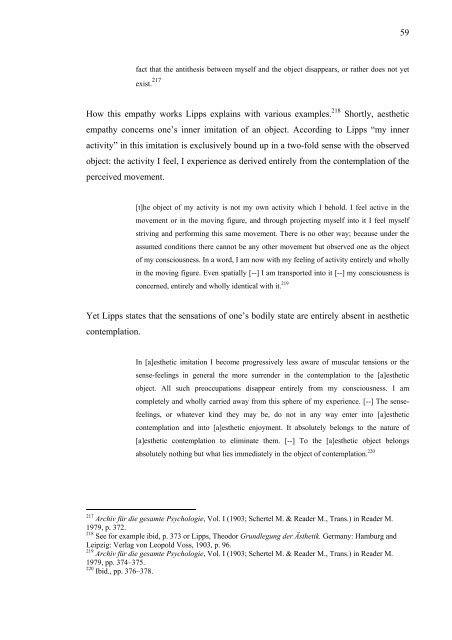Boris Asaf'ev and the Soviet Musicology - E-thesis
Boris Asaf'ev and the Soviet Musicology - E-thesis
Boris Asaf'ev and the Soviet Musicology - E-thesis
Create successful ePaper yourself
Turn your PDF publications into a flip-book with our unique Google optimized e-Paper software.
fact that <strong>the</strong> anti<strong>the</strong>sis between myself <strong>and</strong> <strong>the</strong> object disappears, or ra<strong>the</strong>r does not yet<br />
exist. 217<br />
How this empathy works Lipps explains with various examples. 218 Shortly, aes<strong>the</strong>tic<br />
empathy concerns one’s inner imitation of an object. According to Lipps “my inner<br />
activity” in this imitation is exclusively bound up in a two-fold sense with <strong>the</strong> observed<br />
object: <strong>the</strong> activity I feel, I experience as derived entirely from <strong>the</strong> contemplation of <strong>the</strong><br />
perceived movement.<br />
[t]he object of my activity is not my own activity which I behold. I feel active in <strong>the</strong><br />
movement or in <strong>the</strong> moving figure, <strong>and</strong> through projecting myself into it I feel myself<br />
striving <strong>and</strong> performing this same movement. There is no o<strong>the</strong>r way; because under <strong>the</strong><br />
assumed conditions <strong>the</strong>re cannot be any o<strong>the</strong>r movement but observed one as <strong>the</strong> object<br />
of my consciousness. In a word, I am now with my feeling of activity entirely <strong>and</strong> wholly<br />
in <strong>the</strong> moving figure. Even spatially [--] I am transported into it [--] my consciousness is<br />
concerned, entirely <strong>and</strong> wholly identical with it. 219<br />
Yet Lipps states that <strong>the</strong> sensations of one’s bodily state are entirely absent in aes<strong>the</strong>tic<br />
contemplation.<br />
In [a]es<strong>the</strong>tic imitation I become progressively less aware of muscular tensions or <strong>the</strong><br />
sense-feelings in general <strong>the</strong> more surrender in <strong>the</strong> contemplation to <strong>the</strong> [a]es<strong>the</strong>tic<br />
object. All such preoccupations disappear entirely from my consciousness. I am<br />
completely <strong>and</strong> wholly carried away from this sphere of my experience. [--] The sensefeelings,<br />
or whatever kind <strong>the</strong>y may be, do not in any way enter into [a]es<strong>the</strong>tic<br />
contemplation <strong>and</strong> into [a]es<strong>the</strong>tic enjoyment. It absolutely belongs to <strong>the</strong> nature of<br />
[a]es<strong>the</strong>tic contemplation to eliminate <strong>the</strong>m. [--] To <strong>the</strong> [a]es<strong>the</strong>tic object belongs<br />
absolutely nothing but what lies immediately in <strong>the</strong> object of contemplation. 220<br />
217<br />
Archiv für die gesamte Psychologie, Vol. I (1903; Schertel M. & Reader M., Trans.) in Reader M.<br />
1979, p. 372.<br />
218<br />
See for example ibid, p. 373 or Lipps, Theodor Grundlegung der Äs<strong>the</strong>tik. Germany: Hamburg <strong>and</strong><br />
Leipzig: Verlag von Leopold Voss, 1903, p. 96.<br />
219<br />
Archiv für die gesamte Psychologie, Vol. I (1903; Schertel M. & Reader M., Trans.) in Reader M.<br />
1979, pp. 374–375.<br />
220<br />
Ibid., pp. 376–378.<br />
59

















